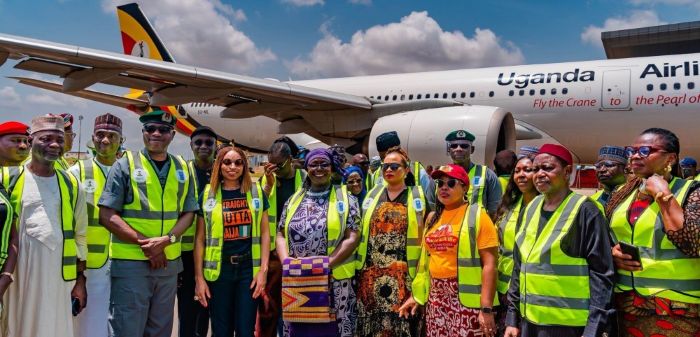(3 Minutes Read)
Nigeria has formally launched a new air corridor under the African Continental Free Trade Area (AfCFTA), connecting its exporters to key markets in Kenya, Uganda, and South Africa through Uganda Airlines. This milestone initiative, announced by the Minister of Industry, Trade and Investment, Dr. Jumoke Oduwole, on Africa Day, is set to reduce logistics costs for Nigerian businesses by an estimated 50% to 75%.
Revealed via Dr. Oduwole’s verified X (formerly Twitter) account, the new air route marks a bold move to deepen intra-African trade and resolve longstanding transportation challenges that have stifled regional commerce. The corridor is designed to facilitate exports in high-potential sectors such as agro-products, textiles, and cosmetics—industries expected to benefit significantly from lower logistics costs and enhanced access to continental markets.
This air corridor represents a key component of Nigeria’s broader strategy to implement the AfCFTA framework, which seeks to establish a unified market for goods and services across Africa. It aligns with AfCFTA’s goal of reducing trade barriers and improving market access for both SMEs and large exporters.
Nigeria’s trade posture under AfCFTA has recently gained momentum, bolstered by critical policy reforms. In April 2025, the country finalised and submitted its ECOWAS Tariff Schedule for Trade in Goods to the AfCFTA Secretariat, thereby activating preferential tariffs on 90% of its exports. This reform includes a 50% tariff cut on goods exported to least-developed African countries and a complete duty waiver for exports to developing nations.
The launch also coincides with Nigeria’s commitment to AfCFTA’s Digital Trade Protocol. In a statement earlier in April, Vice President Kashim Shettima reiterated support for the initiative, which aims to raise intra-African trade from 18% in 2022 to 50% by 2030. The protocol facilitates digital commerce, enabling Nigerian tech-driven exporters and SMEs to expand more seamlessly across African markets.
The Ministry of Industry, Trade and Investment reaffirmed that strategic logistics initiatives such as the air corridor are central to enhancing Nigeria’s export competitiveness. By improving cross-border trade efficiency and unlocking duty-free access to vital African economies, Nigeria is positioning itself as a leader in continental trade integration.
Read Also;
https://trendsnafrica.com/united-airlines-re-start-lagos-u-s-route/
Beyond logistics, the corridor is a significant step in Nigeria’s vision to shape Africa’s economic trajectory. With direct air freight routes to East and Southern Africa now operational, Nigerian exporters can engage more efficiently with two of the continent’s fastest-growing regions, bolstering not only trade volumes but Nigeria’s role in AfCFTA’s long-term success.





